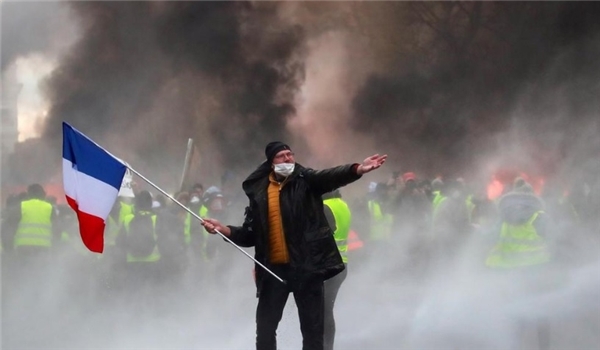
RNA - Sixty-six percent of those questioned said they supported the protests sparked by higher fuel taxes, underway for the past 12 days, which have seen hundreds of thousands of people take to the streets wearing high-visibility yellow jackets, AFP reported.
Only 32 percent of respondents said they opposed the movement, which has caused economic disruption as demonstrators hold up road traffic, the Opinion Way survey found.
The poll was carried out on Tuesday after Macron sought to defuse the unrest by pledging to defer future tax rises in times when international oil prices are increasing.
The centrist president also pledged a three-month public consultation aimed at producing a roadmap to help France shift to a low-carbon economy without penalising low-income families.
But he refused to go back on an increase in fuel tax which is due to come into force in January, saying it is needed help fight pollution.
While initially focused on fuel taxes, the "yellow vest" movement has snowballed into wider protests against economic hardship in provincial France and perceived elitism on Macron's part.
Seventy-eight percent of the 1,013 people questioned said the measures announced by the president were "wholly" or "mostly insufficient".
Nearly 80 percent oppose the planned fuel tax hike in January.
The survey, conducted for LCI television, RTL radio and the Le Figaro newspaper, showed relatively stable support for the "yellow vests" since the start of the movement.
Violent protests in Paris last weekend made international headlines when the city's most famous boulevard, the Champs-Elysees, was engulfed in smoke from tear gas and burning barricades.
Prime Minister Edouard Philippe said Tuesday that he was ready to meet a delegation of protesters, adding that "what they say includes a lot of very legitimate demands which must be heard".
But such a meeting might prove difficult to organise as many in the grassroots movement, which emerged through social media, have refused to recognise eight "representatives" chosen in a Facebook ballot.
The movement has also refused any alignment with political parties or labour unions.
Philippe, told RMC radio and BFMTV he would start discussing grievances with trade unions, community groups and local officials on Thursday in line with Macron's effort to engage with the public.
Annick Girardin, minister for France's overseas territories, was meanwhile engaged in her own peace efforts on Wednesday, meeting with "yellow vests" in the Indian Ocean island of La Reunion where the protests have erupted into rioting and paralysed the local economy.
Philippe confirmed the January 1 tax increase which will see petrol prices go up by three euro cents a litre (about 3 US cents) and diesel by 6 euro cents.
Should international oil prices later surge "we shall not add extra taxes", he promised, but "shall return to the tax level of January 1".
The government had earlier announced measures to help finance the buying of more fuel-efficient cars and heating appliances in an unsuccessful bid to stave off the protests.
The minimum wage of 9.88 euros ($11.15) an hour will also go up in line with inflation --- currently running at more than two percent --- in January, Philippe announced.
As complaints grow that France's poorest struggle to make ends meet, trade unions have been calling instead for an above-inflation boost to the minimum wage, earned by 11.5 percent of the workforce.
Both the CGT trade union and a number of prominent "yellow vests" have called for fresh demonstrations in Paris on Saturday.
847/940